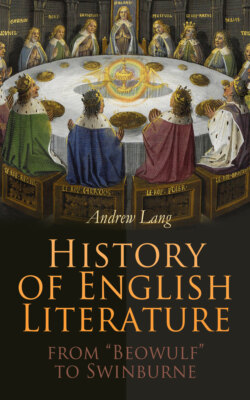Читать книгу History of English Literature from "Beowulf" to Swinburne - Andrew Lang, Robert Kirk - Страница 82
На сайте Литреса книга снята с продажи.
Gawain Douglas.
ОглавлениеGawain Douglas was of the family of the Red Douglases, Earls of Angus, who rose on the ruin of the turbulent Black Douglases, of the House of Bruce's good Lord James, when they failed in their alliance with England against the Crown of Scotland. The Red Douglases also rose high, and had their own feud with the Crown and alliance with or servitude to Henry VIII and the Protestant cause. Gawain was a younger son of the Earl of Angus called Bell the Cat, who hanged the artistic favourites of James III. As an old man he was present at Flodden (1513) where James IV died so gallantly, and his grandson, now Earl of Angus, married Dunbar's "Rose," Margaret Tudor, widow of James IV. Gawain himself, born about 1473 or 1474, was educated at St. Andrews University, took orders, and, being of a powerful House, received rapid clerical promotion.
His poems were written in the peaceful and prosperous years of James IV, between 1501 and 1513, the date of Flodden and of the completion of Gawain's translation of the "Æneid" of Virgil. His earlier works "The Palice of Honour" and "King Hart," are merely rhymed allegories after the manner of the unceasing "Roman de la Rose," and have no special interest. What is true about one of these belated last allegories is true of another: they are no longer to be read for mere literary pleasure. In his "Æneid," Douglas introduces original prologues to the books of the "Æneid," rather in the manner of Scott's poetical epistles between the cantos of "Marmion". He describes winter, spring, and summer in Scotland. He criticizes, not unfavourably, the theology of Virgil, whom the Middle Ages regarded, now as a magician (like Ovid among the Italian peasantry to this day), and now as an inspired prophet of the coming of Our Lord. He attacks Caxton for printing a translation of Virgil, not from the original Latin, but from a French version. His criticism of Caxton is full of detail, and severe. He himself is "bound to Virgil's text," and he does not treat it, as a rule, with the licence of Chapman when rendering Homer into English verse; but Gawain remarks, truly, that sometimes of one word he must make three, must occasionally expand in exposition, and add, in colouring.
Sum tyme I follow the text als neir I may,
Sum tyme I am constreinit are uther way.
His remarks on the task of the translator show considerable reflection. On comparing the poem with the Latin it seems more close in sense to the great untranslatable original than might have been expected in an uncritical age and country. It is the first attempt in our language at the rendering of a great ancient classic, and, as such, looks forward to the new times, and to the Renaissance which, in Scotland, was mainly confined to Biblical criticism.
After Flodden, Gawain was immersed in politics, and in a long and futile struggle to obtain, through English influence, the Archbishopric of St. Andrews. For this he fought a triangular duel (nor were the weapons of the flesh unused), with Hepburn, the Prior, and Forman, a clerical diplomatist, who was successful. Gawain obtained the petty Bishopric of Dunkeld, on the Tay, and died when on a political mission to London (1522). Gawain is almost the only Scottish example of a nobleman and a Churchman, in his age, distinguished for devotion to literary scholarship. There are a number of Scots poems, of this date, such as "Christ's Kirk on the Green" and "Peebles at the Play" (the best of them), which show much command of lively metre and rude descriptive powers where rustic merriment and horseplay are to be painted. But their dialect is usually uncouth, and they are only appreciated by special students.
